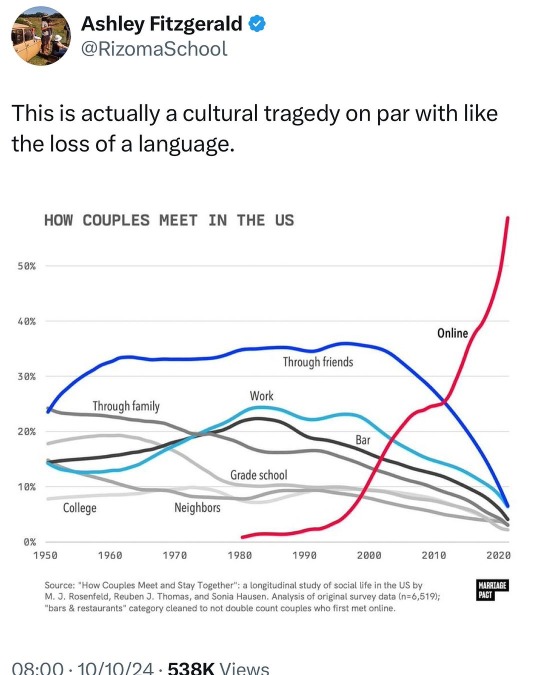#Data manipulation
Explore tagged Tumblr posts
Text






LMAO. When Grok got too woke, Elon had his minions at Twitter alter the algorithm to make it not include Musk and Trump.




Twitter is a propaganda + disinformation machine owned by an authoritarian, Nazi-saluting, Apartheid-loving snowflake.
#politics#elon musk#donald trump#twitter#grok#disinformation#data manipulation#anthony fauci#chatgpt#chat gpt#deepsearch
100 notes
·
View notes
Photo

𝚟𝚎𝚗𝚎𝚎𝚛
#ascii art#ansi art#code page 437#hexadecimal#datamosh#databend#data manipulation#data art#cyber art#indescribable#posterized#loss#frutiger aero#cyberpunk#art excercise
17 notes
·
View notes
Text
Person of Interest (2011-2016)
#person of interest#cyberpunk aesthetic#hacking#graphic design#surveillance#science fiction#surveillence state#hackers#cybersecurity#scifi#mobile hacker#code breaker#data manipulation#network security#infosecurity#10s#command line
81 notes
·
View notes
Text

Mandala designed with footfall data
#mandala#mathematics#mathblr#math art#data#data manipulation#data art#artwork#art#artists on tumblr#small artist#university#student#university life#university student#art study#study motivation
5 notes
·
View notes
Text
The collapse of the U.S. economy is imminent. The published GDP data that isn't outright falsified, is manipulated to the extent that the data literally isn't true, and the data that isn't falsified or manipulated, is either outdated, or based on fraudulent activity. The only possible way to save the economy before it collapses, because of how long our politicians have waited to address this issue they keep issuing bandaid fixes for, is to somehow gather accurate data on black market economic activity, and then include that in the GDP data, and that still will only be a bandaid fix that will offer at least some significant leeway, hopefully enough for our leaders to gain the spines, balls, and morals necessary to do what actually needs to be done to permanently fix the issue with our economy.
#economic collapse#America#United States#economy#collapse#U.S. economy#House of Cards#black market#GDP#data#economic data#fraud#data manipulation#data falsification#bandaid fixes
3 notes
·
View notes
Text
i use it only when it's free..
use jasp already🌚

2 notes
·
View notes
Photo

𝚛𝚎𝚖𝚒𝚗𝚍𝚎𝚛
#ascii art#ansi art#code page 437#hexadecimal#datamosh#databend#data manipulation#data art#cyber art#indescribable#posterized#loss#frutiger aero#cyberpunk#art excercise
13 notes
·
View notes
Text

footfall mandala shadow
#black and white#data manipulation#math#math art#mathematics#mathblr#data art#data#university student#university life#university#geometry#pattern#geometric#shapes#texture#abstract#abstractart
2 notes
·
View notes
Text
Oregon, and Portland especially, has lower literacy rates than they let on through the data they publish that is relevant to literacy and educational metrics.
#Portland#Oregon#literacy#educational metrics#data#institutional data#data publishing#data manipulation#education#school#public school#schooling
0 notes
Text
okay wait reblogging this again because @rederiswrites pointed out in the replies that this fucking graph ends in 2020, which means it's saying something ENTIRELY DIFFERENT than I originally thought without noticing that context.
Always contextualize the data, kids. Always question the context in which the data was collected. Just because it's math doesn't mean it's not painting a biased picture.
While there is a downward trend prior to that 2020 date, there's a reason everything converges on that point the way it does, and is very much going to skew any graph results. Additionally, the graph ending in 2020 does NOT show if the downward trend corrected at all AFTER 2020, which means it could be withholding part of the data in order to reinforce the narrative that couples only meet online now.
Thanks Red for pointing that out, gave me a good think this morning!

#data manipulation#lol it's so easy to miss little bits of context like that#which is why it's important to always be open to re-examining something with a more critical eye
57K notes
·
View notes
Text

Pandas, today's powerful data analysis library acts up to facilitate enhanced data manipulation. Want to know how? Read to comprehend its minutest manouvers and diverse usage with USDSI®. Click link: https://bit.ly/4hhHDBs
0 notes
Text
SQL & Power BI Certification | MITSDE
Enhance your career with MITSDE’s Online Power BI Certification Course! This comprehensive program equips you with essential skills in data visualization, analytics, and business intelligence, helping you make data-driven decisions. Learn to create interactive dashboards, generate insightful reports, and analyze business trends effectively. Designed for professionals and beginners alike, this course offers hands-on training and expert guidance to boost your expertise. Stay ahead in the competitive job market—enroll today and transform your data analysis skills with Power BI!
#SQL & Power BI Certification Program#Power BI Certification#powerbi course#MITSDE#Data management#Data visualization#Data Specialist#Data manipulation#Data analytics#Business intelligence#Power BI Course
0 notes
Text
Elisabeth Margaretha Harbers-Bik is a Dutch microbiologist and scientific integrity consultant. Bik is known for her work detecting photo manipulation in scientific publications, and identifying over 4,000 potential cases of improper research conduct.
Meet this super-spotter of duplicated images in science papers | Nature
every time I see some bigshot scientist revealed as a fraud my knee-jerk reaction is "hell yeah elisabeth bik got 'em good" AND IM RIGHT

SHE NEVER QUITS!!!!


ICONIC!!!!
84K notes
·
View notes
Text
Uber’s Greyball Program: How Data Misuse Undermined Fair Information Practices
Picture a world where your data is not used to enhance your user experience, but rather help companies evade regulations. Sounds concerning, right? But that is exactly what happened with Uber’s Grayball program. The company that revolutionized the way public transportation works today have often been a center of global regulatory conflicts. Governments from various different cities and countries opposed Uber’s service, attempting to restrict or prohibit its activities. In 2014, Uber responded by developing the Greyball program approved by Uber’s legal team. This invisible mechanism leveraged user information to escape authorities and law enforcement. By doing this, Uber violated several significant data ethical and privacy rules, which infuriated many people and led to legal investigations. We'll discuss how Uber's Greyball campaign violated several important Fair Information Principles in addition to undermining local laws. Let's examine Greyball's characteristics and operation in more detail before exploring the moral repercussions of Uber's activities.
What Was Uber’s Greyball Program? Uber's Greyball program was a hidden scheme the firm employed to find and evade authorities, law enforcement, and other people trying to enforce regional laws against its ride-hailing services. The concept was created to assist Uber in getting around legal restrictions in nations and localities where its activities were either prohibited or restricted. Uber used Greyball to prevent regulators from booking trips on the app. The program worked by manipulating the app’s interface to display fake ride options to suspected authorities. In some cases, it would also prevent the ride from being booked altogether or show a "ghost" car on the map to create the illusion of service availability without actually providing any rides. It used location data to detect users near government buildings or restricted areas and monitored high-frequency ride requests in these zones. Credit card information was also analyzed, flagging users whose payment details matched known regulators or authority figures. Additionally, app usage patterns such as the speed of ride bookings, frequency of app usage in restricted areas, and attempts to book rides in banned zones were tracked, helping Greyball identify suspicious users and prevent them from accessing Uber's service. When the public learned the truth, these tactics ultimately backfired, even though they might have protected Uber's drivers and increased earnings. Businesses like Uber face greater accountability for how they manage personal data as customers grow more conscious of their rights. This leads us to the ethical standards that Uber transgressed when it used Greyball, emphasizing how crucial openness and ethical data handling are to preserving trust among clients.
Data Ethics and Uber's Greyball: Where Did Uber Go Wrong? A set of guidelines known as "fair information practices" defines how an data-driven society may handle, store, manage, and move around information while preserving security, privacy, and fairness in an increasingly changing worldwide technological environment. Uber’s Greyball program violated several of these principles by using personal data to avoid regulators, bypassing ethical standards for accountability. Next, we'll explore how Greyball directly violated these principles and the ethical implications of such breaches.
Uber misused user-provided personal information, in abuse of several fundamental ethical data usage standards. Contrary to its initial goal of offering ride services, Uber collected data without user consent and utilized it anonymously to elude authorities in defiance of the Collection Limitation Principle. The data was altered to identify regulators, which distorted its accuracy and undermined users' expectations, in violation of the Data Quality Principle. By repurposing the data for legal evasion—a goal not revealed at the time of collection—the corporation also broke the Purpose Specification Principle. Additionally, Uber violated the Use Limitation Principle by using personal data for an unlawful and unethical purpose—to avoid regulatory enforcement—instead of the original purpose. By hiding the existence of the Greyball program and denying any responsibility for it, Uber broke both the Openness Principle and the Accountability Principle. There was a severe lack of transparency about the handling of users' data because they were unaware that it was being utilized in this manner. Furthermore, Uber demonstrated a lack of accountability by refusing to acknowledge the acts committed under Greyball. The public's faith in the business was further damaged by this failure to resolve the problem and be transparent.
Uber faced strong public criticism for its actions with the Greyball initiative, which was a clear violation of fundamental data ethics rules. The legal repercussions, however, were much less harsh than many had anticipated. Uber's evasions prompted investigations, including one by the U.S. Department of Justice, despite the ethical offenses. The company's use of Greyball to evade regulators was the main focus of the investigation. Surprisingly, though, not much legal action was taken, maybe as a result of Uber's calculated change of system after the New York Times revealed its tactics, along with the company's use of excuses such as driver security to justify its actions. This lack of strong legal obligation highlights the broader consequences of corporate data exploitation; when immoral conduct is covered up and later revealed, the company's liability is often delayed or diminished. It serves as a reminder that, despite the importance of data ethics and standards, they are nevertheless difficult to regularly and openly enforce.
Conclusion Uber's Greyball program brings up significant issues regarding data ethics and corporate responsibility. Is self-regulation sufficient, or should businesses be legally obligated to adopt moral standards like the Fair Information Principles? Many businesses make the claim that they follow their own codes of conduct, but as Uber has shown, they frequently find ways to get around the law to further their own agendas, even when they justify practices like ride cancellations under the pretext of "driver safety." Can we really be sure that our personal data is being treated ethically if there isn't a single, global standard that all businesses must adhere to? When will we be able to tell if our personal information is being utilized against our will? This poses the more important question - how can we safeguard our privacy in society when data is being exchanged and used for profit all the time? We must figure out how to hold businesses responsible and ensure that user rights are upheld in the digital sphere as technology continues to advance.
#UberGrayball#DataEthics#Privacy Violations#privacy rights#tech ethics#digital privacy#User Rights#personal data#data manipulation#corporate accountability#surveillance#ethical laws#ethical principles
1 note
·
View note
